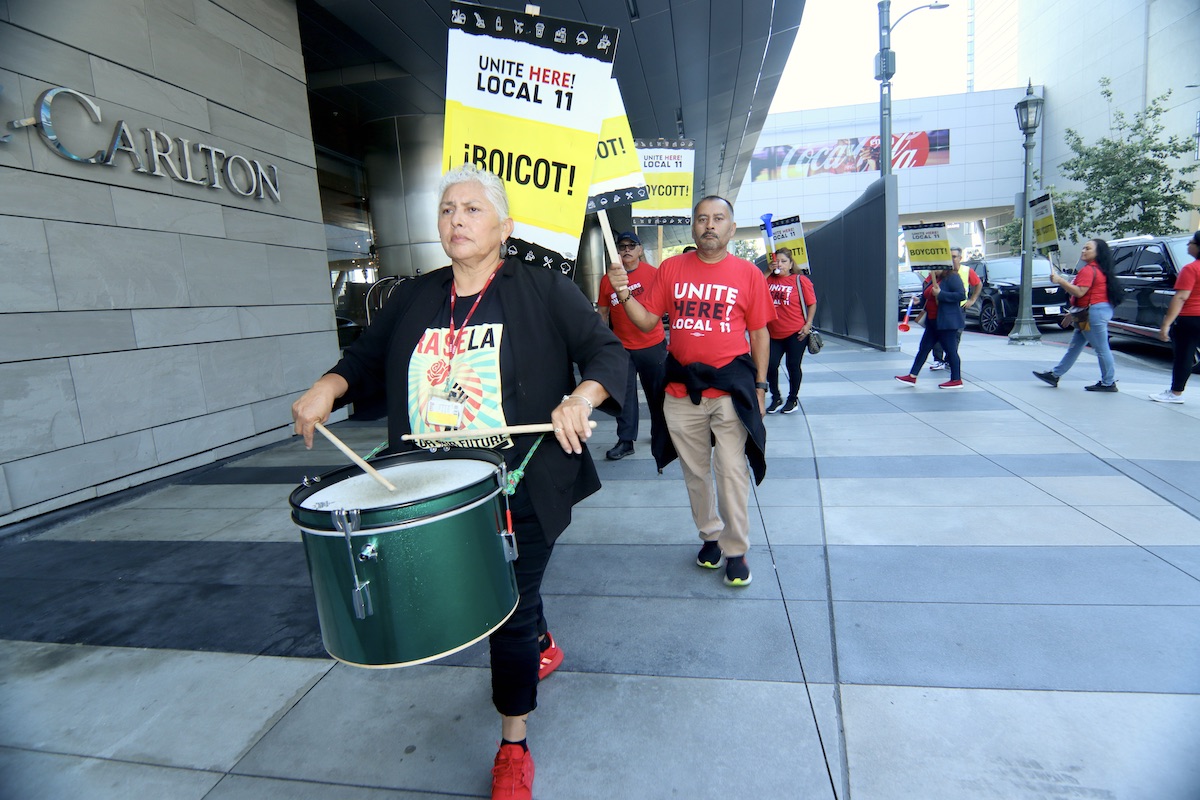Skift Take
Most meeting planners or sponsor organizations are standing with labor, but those still having events, as well as hoteliers, are seeing repercussions.
Meeting organizers slated to bring groups to Los Angeles continue to support the cause of striking hotel workers there. They are moving events to other properties or canceling — even paying penalties to do so. Meanwhile, area hoteliers are concerned about the labor action’s impact on the city and its hospitality community. Labor union Unite Here Local 11 remains defiant.
The Japanese American Citizen League (JACL) last month moved its annual conference from the Doubletree by Hilton Hotel Los Angeles Downtown to the Westin Bonaventure Hotel & Suites — the only union hotel downtown that has settled with Unite Here Local 11 — and venues in the Little Tokyo section of town. Program for Torture Victims (PTV) also relocated its conference last month (from an undisclosed hotel embroiled in the strike) to the Westin.
JACL negotiated out of a cancellation fee but was on the hook for $30,000 of food already ordered, executive director David Inoue told Skift. Additionally, PTV, a small non-profit organization, coughed up nearly $10,000 in damages. Still, those in charge had no qualms about their decisions.
“We didn’t want to cross a picket line,” Inoue said. “To say we’re a civil rights organization, we must also be pro-labor.” Similarly, PTV executive director Ana Grande said, “The most important thing for us was sticking to our principles and values. Those we work with are often tortured in their own country by standing up for their rights, so we need to stand up for rights here. Did we get hit? Sure. Would we do it again? Absolutely.”
Activism’s Hidden Costs
But those principles carried other costs. JACL moved a big reception from the Doubletree to a restaurant in Little Tokyo. As a result, it had to reduce its guest list because the new venue was smaller. Additionally, the association is now considering pausing some staff upgrades. “We’re growing, and we were hoping to hire some additional staff, but that may have to be deferred.”
Several other organizations canceled meetings, but not the American Political Science Association (APSA). It held its annual conference over Labor Day weekend, despite numerous members staying home in protest. The group reportedly would have owed millions if it canceled. APSA did not respond to a request for comment.
Hoteliers fear the strike’s consequences. “They’re concerned about being able to provide the right level of service and not hurt repeat business,” said Jeff Bzdawka, CEO of Knowland, a hospitality data firm focused on meetings. “And the bigger concern is cost. If demands are met for increased wages, benefits and hours, can that be sustained, and can profitability continue with increased room rates?”
Table Stakes of Hotel Strikes
“Local hotel operators have other worries,” said Pete Hillan, spokesperson for the Hotel Association of Los Angeles and California Hotel & Lodging Association. “It’s not good when the union says ‘don’t come to Los Angeles.’ It becomes a long-term issue since conventions are booked several years out.”
He contended that the union is delaying negotiations. “The last time we met was July 18th, and the union has refused to come back to the table. We suggested dates that were rejected or ignored, and that shows they’re not interested in an agreement, just in street theater, and it’s detrimental to the city’s hospitality industry.”
Unite Here Local 11 president Kurt Petersen responded. “It’s true that the last meeting was in July, but the hoteliers walked out. They did send dates, and we’ll respond soon, but we want to make sure it’s what our leaders and shop stewards want because they’re so angry at their employers. The hotels have shown again and again that they don’t care that workers can’t afford to live in the areas where they work.”
He continued, “The hotels say what we’re asking for is unprecedented, but so are their profits and cost-of-living increases. If you’re worried about the long-term impact, pay a living wage. The obstacle isn’t us, it’s them.”





